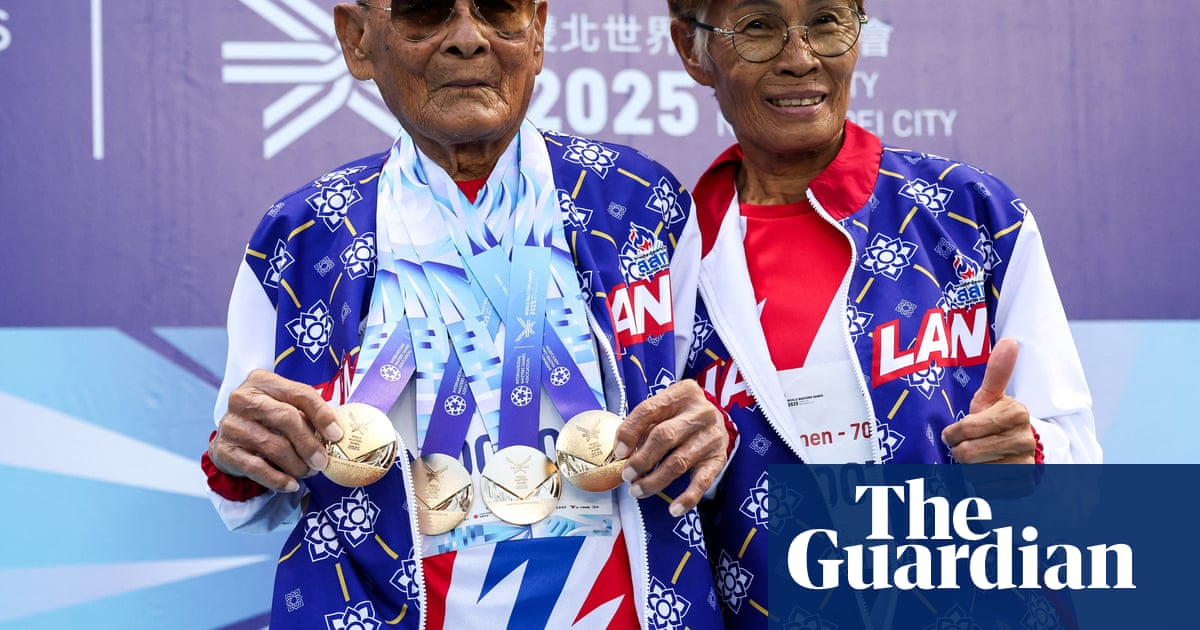For the 105-year-old Thai athlete Sawang Janpram, the day normally starts at 5.30am. He has a breakfast of two boiled eggs, some protein, vegetables and fruit, and by 6am or 7am he’s out at the beach or local stadium near his home in Rayong province, training with his 73-year-old daughter Siripan.
He will walk between 1km and 2km before doing a quick 100m run, once or twice. Then, he practises one of his other sports: javelin, discus or shot put.
Sawang’s training regime has proven effective – just last week, he won four golds at the World Masters Games in Taiwan. He was, media reports remarked, in a league of his own at the event – as the oldest competitor at the games and the only person in his age group, he was almost certain to win the men’s 100-plus discus, javelin, shot put and 100m, which he completed in 38.55 seconds.
What’s the secret to his longevity and success? “Regular exercise, healthy food, staying in a good mood, always being calm, breathing clean air and keeping up good hygiene,” he says. “If I’m sick, I go to see the doctor.”
Sawang has always loved sports, watching it on TV or at local competitions. “I like to watch boxing, and my favourite is Pone Kingpetch,” he says, referring to Thailand’s first world boxing champion, who retired in the 1960s.
It was not until Sawang turned 97 that he began competing. He was inspired by Siripan, an athlete with the Thai VeteranAthleticsAssociation, who would bring her father along to watch her compete at events. “He started to like the atmosphere because he could make new friends and see new people. He saw that even though the people involved were 60-, 70- or 75-year-old athletes, they were still able to participate,” says Siripan.
At first, Sawang’s family worried that the travel required for competitions may be too tiring. But 21 games and 78 medals later, it has all gone well, Siripan says.
There are days when he feels a bit lethargic, says Sawang with a laugh, but the sight of his daughter heading out normally spurs him on. “If I notice that he looks a bit tired, we just do walking, no jogging, or any other form of practice,” says Siripan. Going outside, and being active, has benefits beyond physical fitness. “I can see that he looks refreshed when he sees other people. It’s only two of us in the house, and it’s better to keep going out,” she adds.
Sawang likes to eat vegetables andnam prikpao– a spicy dipping sauce made with chillies, shallots, garlic, dried shrimp and fish sauce – as well asgaeng liang, a vegetable soup, andgaeng som, a spicy and sour fish curry with rice. He rarely eats pork, and mostly sticks to vegetables and fish.Siripan explains that they eat healthily and that the air quality is good near to the beach where they exercise. Her father also keeps up a positive attitude, he adds. “If he gets sick or needs to take medicine, he’s never stubborn about it.”
She believes the main barrier preventing older people in Thailand from exercising is a lack of support. “They don’t want to do it alone, and especially for elderly people, they need help and assistance,” she says. Thailand is considered an ageing society, with 20% of the population more than 60 years old.
“Elderly people especially can get quite lonely at home – their children or relatives are out at work, so they stay home all day alone,” she says. Exercise can “make them feel lively again”.
She hopes her father’s success will inspire others. “When I look at the comments on social media, I see a lot of positive responses. People are saying ‘Grandpa is so great’ and that they wanted to be fit as Grandpa,” she says. “I am very happy, and I’m very proud of my dad – that he stays strong and he has the discipline to keep fit. I know that he doesn’t want to be a burden to our family,” says Siripan, who also won two gold medals and a silver in Taiwan.
Both Sawang and Siripan plan to take a few days off after their success, but will get stuck into training again next week. They are already gearing up to qualify for the 23rd Asia Masters Athletics Championships, which will be held in India in November.
“I want everyone to start exercising so they will be strong and not getting sick,” says Sawang.His advice to others who want to get fit? “If you go out to exercise with friends, you will get a chance to know them more – and it’s fun.”
